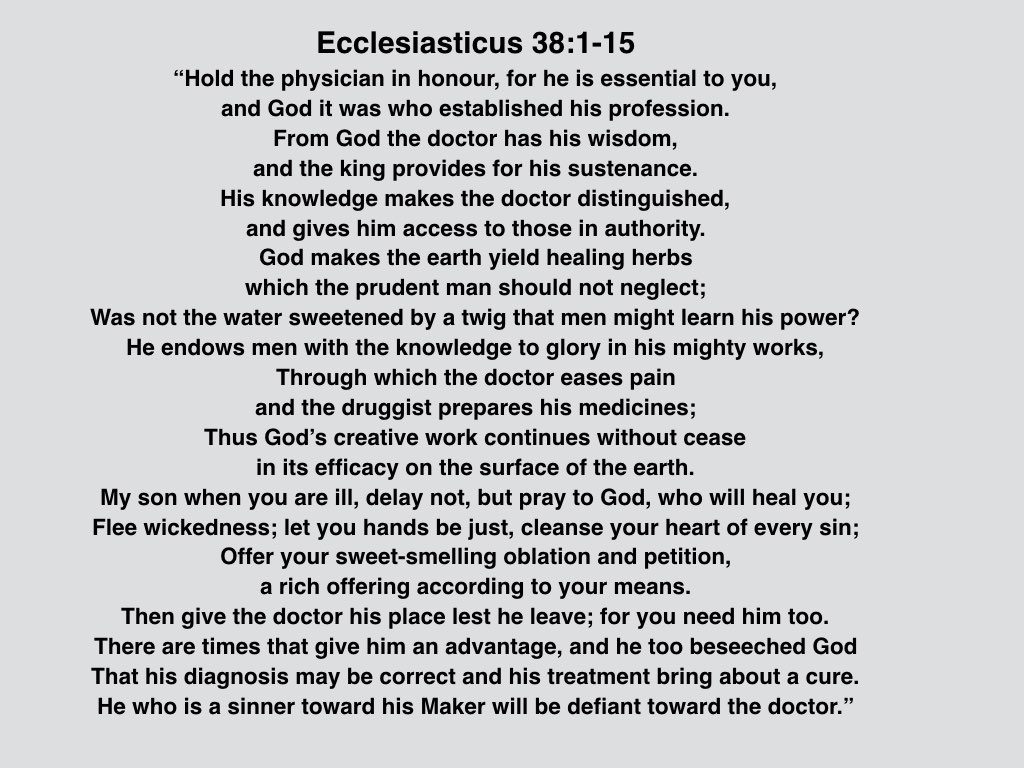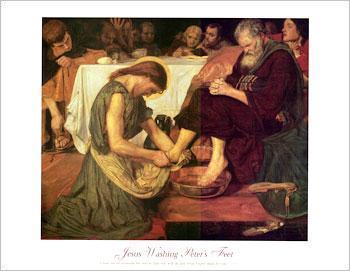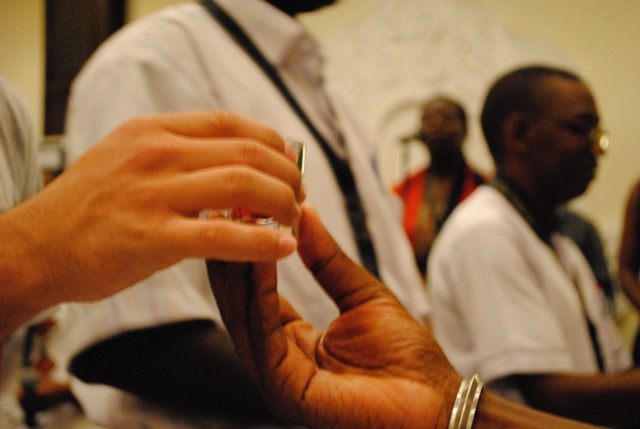by Christine Sine
Does God care about physical health or only about our spiritual wellbeing?” It is a good question to ask ourselves as we discuss shalom and wholeness this month. I often struggled with this as I worked in poor communities in Africa and Asia. I still struggle with it as I watch friends die of cancer and observe the devastating impact of environmental degradation on our health.
 I love this interesting reference to health care workers that I found. It is not in the Protestant Bible but in the Appocrypha, those books between the Old and New Testament that are considered by some to be a part of the Biblical text.
I love this interesting reference to health care workers that I found. It is not in the Protestant Bible but in the Appocrypha, those books between the Old and New Testament that are considered by some to be a part of the Biblical text.
God Does Care
From the time the children of Israel came out of Egypt God showed concern for their physical as well as their spiritual well being. However God’s prescription for health was always very different from that of the surrounding cultures. During Moses life, the Papyrus Ebers written about 1552 B.C. provided many of the standard treatments for disease. Drugs included “lizards’ blood, swines’ teeth, putrid meat, stinking fat, moisture from pigs ears, goose grease, asses’ hoofs, excreta from animals, including human beings, donkeys, antelopes, dogs, cats and even flies.”
Not quite our idea of good medicine and not God’s either.
However God’s prescription for good health doesn’t necessarily look like a physician’s prescription either. Pills and surgery are not at the top of the list. And as with so much of what God does, good health doesn’t usually come with the waving of a magic wand and miraculous healings.
God Believes in Preventative Measures.
Health and healing, the practice of medicine and the principles of hygiene in the Hebrew world, all fell under the Levitical mantle, part of the religious framework of life. Medicine and the care of the sick is part of the priestly calling a life set aside in service to God.
It was the Levites to whom God gave the principles for health and hygiene. They were responsible for both the physical and spiritual health of the community. Physical cleanliness was for the priests a symbol of spiritual cleanliness. One depended on the other and both were performed by those people whose lives were set aside to serve God. God gave them detailed instructions for basic cleanliness and sanitation that if followed today would greatly increase the level of hygiene in many a struggling nation. It would be hard for us to imagine our church workers as garbage disposal experts or as sanitation workers, yet for the Levites this all came under their jurisdiction.
God’s health laws encourage us to think responsibly about what we eat, how we act and how we treat the environment around us. Many of the laws of Leviticus are good preventative health directives that we still use today. These regulations include nutrition, environmental laws and behaviour – the three primary factors that influence the health of any individual or community. Others are guidelines for how the most vulnerable in society are to be cared for. We shouldn’t over eat, abuse our bodies with drugs and alcohol or pollute the environment and blame God for the consequences to our health.

God Made Us To Be Healthy
Nothing speaks more highly of God’s desire for healing than the incredible systems of protection and repair within our own bodies. The immune system cures most of the illnesses that attack us. Wounds heal, bones knit together and tissue repairs itself in miraculous ways we rarely think about unless something goes wrong. Fascinatingly this system is enhanced by bacteria in our gut and in our environments. In Let Them Eat Dirt: Saving Your Child From an Oversanitized World, Brett Finlay and Marie-Claire Arrieta, document how microbes improve our health and that of our children. It is fascinating. At best doctors and nurses assist God’s healing work yet we rarely thank God for the miracle of how we are created.
Unfortunately in our imperfect world, corrupted by sin and disease, these systems don’t always work but God provided other elements to assist the healing process. Most modern medicines originate from medicinal plants and herbs that are a part of God’s wonderful creation.
Interestingly the Greek word most commonly translated save in the New Testament SOZO can also be translated heal. It means to heal, preserve, save, make whole. Central to God’s model of health and wholeness is reconciliation to God. Healing depended not only on the taking of medicine but primarily on obedience to God’s word and commandments. Healing from a Christian perspective is the process of moving towards wholeness in body, soul and spirit not just as individuals but as a worldwide community. The purpose of medicine is to support and encourage human wholeness in every respect but it should be used in conjunction with other health measures.

Physical and Spiritual Healing Linked.
For early followers of Christ, spiritual and physical health were linked as one ministry too. In the early Judeo – Christian church, healing was considered part of the religious function of the community. Monetary compensation was forbidden. In contrast the Graeco-Roman tradition professionalized medicine and saw it as a vocation to be monetarily compensated – the model that we now embrace.
The rapid growth of the early church was probably a result of its power to heal, to cast out demons and to create communities of mutual care. Interestingly, this was closely linked to an acceptance of suffering as an identification with the sufferings of Christ and an understanding of physical illness as part of a larger paradigm in which God’s grace works through human weakness. Throughout most of Christian history, the church provided centers for healing and cared for the sick and the suffering. In the Middle Ages the monasteries were centers of healing They were often famous for their herb gardens which provided a broad range of medicinal substances that were produced for the use both within the monastic community as well as in the outside secular community.
In this framework, the medical attendant was seen as a servant to the poor and the sick, someone who came to relieve their pain, to heal their hurts to comfort their concerns. Spiritual and physical health and healing walked hand in hand, separate parts of a whole person.
The Cross is probably the most powerful symbol of and power for healing in the world. Its redeeming and transforming power brings healing to body soul and spirit – and beyond that it brings healing to communities, and eventually will bring healing to our entire broken world.

The taking of communion is another powerful symbol of healing. In many churches healing services are Eucharistic, deliberately linking our need for healing to confession, repentance and forgiveness. (1 Cor 11:27-34) Baptism too, because it infuses a person with new life, the life of Christ, can drive out before it all the powers of sickness and death. (Rom 6: 1-14)
James 5:13-16 lists other important symbols of healing we need to pay attention to. Praying for the sick, often associated with laying on of hands, anointing with oil, singing psalms and hymns, confession and forgiveness are all practices that can encourage the healing process.
Observing the liturgical calendar is another way that God’s people can find God’s healing. “By connecting to the seasons of the church year we enter into a rhythm that focuses every day and every season very intentionally on the One who gives all of life meaning and purpose. By celebrating through the structures of the Church we actually are given the forms we need to become whole and we are given the formulas to make whole every human experience.”
What Is Your Response?
God does will healing not just for us but for all human kind. Incredibly we are asked to become active participants in the process and bring God’s healing and wholeness to others.
Prayerfully consider what God may ask of you to bring wholeness into a part of your life or that of others.


4 comments
Wow Christine, thanks for this well-researched piece. I found great solace in being reminded of God’s desire for my well-being, including my physical health, and the provisions made in Christ to that end, both ultimately and while we are yet on earth, in the Eucharist. I also appreciated the very practical wholistic provisions and guidelines referenced in the piece, including right relationship to the natural created order and the Church’s liturgical year.
Your work has blessed and encouraged me this morning so I’ve shared it so others might similarly be blessed.
Praying that 3 John 2 might be your continued experience,
Denise Armstrong
Thank you
Beautifully written and informative. Thank you, Christine!
I would respectfully say, rather than following the liturgical church calendar, to follow the Hebraic one, which are God ordained times and rhythms. The feasts were meant to be kept for all time and are living ebenezers. Each feast builds upon the one prior in a cycle/circle that points back to Yahweh and are also healing, in a way.
Thank you for your affirmation and for your suggestion. Will need to think about this.